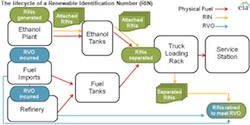A recent “Today in Energy” brief published by the U.S. Energy and Information Administration takes a look at how the Environmental Protection Agency (EPA) monitors Renewable Identification Numbers (RIN) and Renewable Volume  Obligations (RVO) as part of the Renewable Fuel Standard (RFS). RVOs are the targets for each refiner or importer of petroleum-based gasoline or diesel fuel, while RINS allow for flexibility in how each of them may choose to comply.
Obligations (RVO) as part of the Renewable Fuel Standard (RFS). RVOs are the targets for each refiner or importer of petroleum-based gasoline or diesel fuel, while RINS allow for flexibility in how each of them may choose to comply.
The 2013 RFS target is 16.55 billion gallons of renewable fuels including targets for cellulosic biofuels, biodiesel, advanced biofuels in addition to an overall target. Volumes for the four RFS targets are assigned to obligated parties, refiners and importers, by way of RVO percentages that are calculated by dividing each RFS target by the total estimated supply of nonrenewable gasoline and diesel fuel in each year. For 2013, the four proposed RVO targets are:
- cellulosic biofuels – 0.008 percent;
- ethanol equivalent for biomass-based diesel – 1.12 percent;
- advanced biofuels – 1.6 percent; and
- total renewable fuels – 9.63 percent.
Obligated parties must cover their RVOs by surrendering RINS within 60 days after the end of each calendar year.
RINS are used by the EPA as both a way to keep records and build flexibility into the RFS for meeting RFS volumes. Each gallon of fuel is assigned a unique 38 character code and is valid for the year in which it was generated; however, up to 20 percent of a year’s mandate can be met with RINs generated in the previous year.
In addition to monitoring compliance, RINs also add value to each gallon of biofuel to which they are attached. The value of RINs provides an economic incentive to use renewable fuels. If RIN prices increase, blenders are encouraged to blend more renewable fuels. However, when the biofuel is more costly than nonrenewable fuels but is still needed to meet RFS standards, the RIN value should increase to a point at which firms will increase biofuel blending.
And there you have it: EPA’s 411 on RINs and RVOs. Click here for more information.

